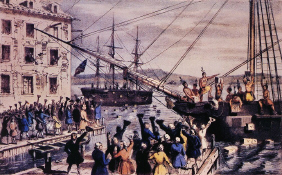| United States
History
In ports up and down the Atlantic coast, agents of the East India Company were forced to resign, and new shipments of tea were either returned to England or warehoused. In Boston, however, the agents defied the colonists and, with the support of the royal governor, made preparations to land incoming cargoes regardless of opposition. On the night of December 16, 1773, a band of men disguised as Mohawk Indians and led by Samuel Adams boarded three British ships lying at anchor and dumped their tea cargo into Boston harbor. They took this step because they feared that if the tea were landed, colonists would actually comply with the tax and purchase the tea. Adams and his band of radicals doubted their countrymen's commitment to principle. A crisis now confronted Britain. The East India Company had carried out a parliamentary statute, and if the destruction of the tea went unpunished, Parliament would admit to the world that it had no control over the colonies. Official opinion in Britain almost unanimously condemned the Boston Tea Party as an act of vandalism and advocated legal measures to bring the insurgent colonists into line. 
Custom Search
Source: U.S. Department of State |
 In 1773, however, Britain furnished Adams and his allies with an
incendiary issue. The powerful East India Company, finding itself in
critical financial straits, appealed to the British government, which
granted it a monopoly on all tea exported to the colonies. The
government also permitted the East India Company to supply retailers
directly, bypassing colonial wholesalers who had previously sold it.
After 1770, such a flourishing illegal trade existed that most of the
tea consumed in America was of foreign origin and imported, illegally,
duty- free. By selling its tea through its own agents at a price well
under the customary one, the East India Company made smuggling
unprofitable and threatened to eliminate the independent colonial
merchants at the same time. Aroused not only by the loss of the tea
trade but also by the monopolistic practice involved, colonial traders
joined the radicals agitating for independence.
In 1773, however, Britain furnished Adams and his allies with an
incendiary issue. The powerful East India Company, finding itself in
critical financial straits, appealed to the British government, which
granted it a monopoly on all tea exported to the colonies. The
government also permitted the East India Company to supply retailers
directly, bypassing colonial wholesalers who had previously sold it.
After 1770, such a flourishing illegal trade existed that most of the
tea consumed in America was of foreign origin and imported, illegally,
duty- free. By selling its tea through its own agents at a price well
under the customary one, the East India Company made smuggling
unprofitable and threatened to eliminate the independent colonial
merchants at the same time. Aroused not only by the loss of the tea
trade but also by the monopolistic practice involved, colonial traders
joined the radicals agitating for independence.